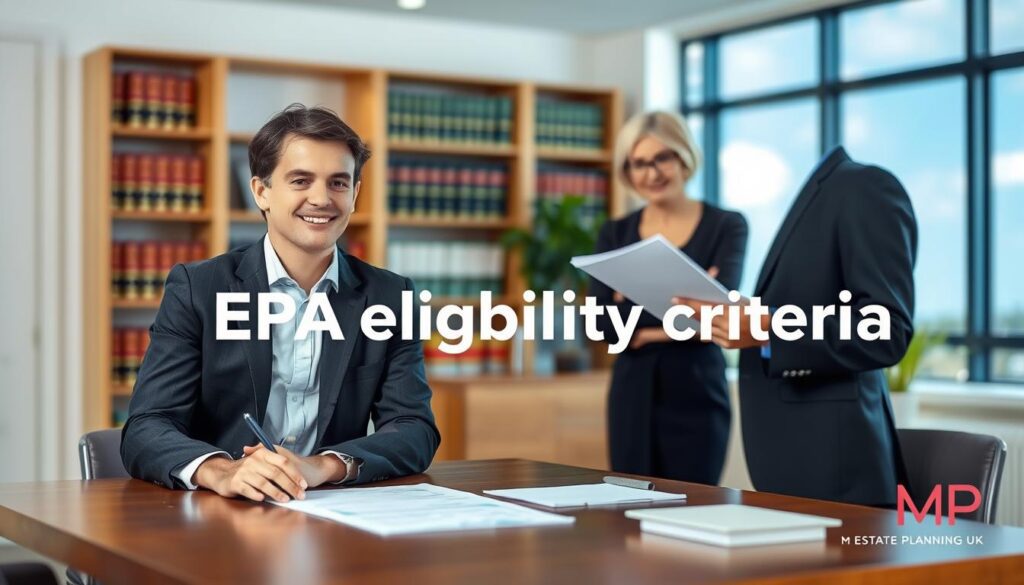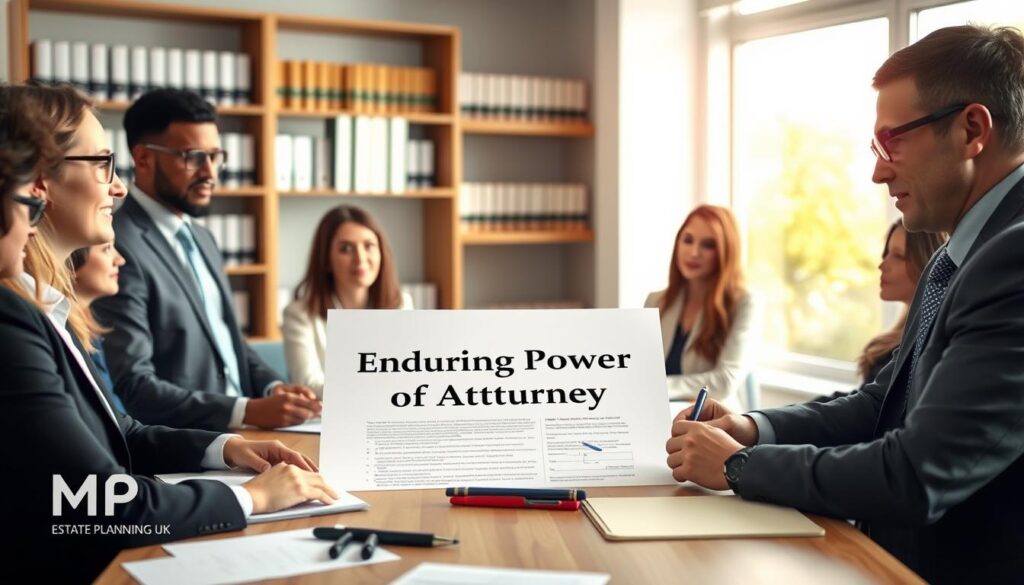Did you know that thousands of individuals in the UK lose mental capacity every year, making it essential for their loved ones to manage their affairs? An Enduring Power of Attorney (EPA) is a legal document that allows you to appoint someone you trust to make decisions on your behalf if you become unable to do so.
We understand the importance of planning for the future, and registering an EPA is a crucial step in this process. In this guide, we will walk you through the lasting power of attorney application process, ensuring you have the necessary information to protect your assets and your family’s future.
Key Takeaways
- Understand the importance of registering an EPA in the UK.
- Learn the step-by-step process for EPA registration.
- Discover the required documentation and notification process.
- Find out about the fees associated with EPA registration.
- Get insights into the benefits of having a registered EPA.
What is an Enduring Power of Attorney (EPA)?
Understanding the concept of an Enduring Power of Attorney is crucial for effective estate planning. An EPA is a legal document that allows someone to manage your financial affairs if you lose mental capacity.
As stated by a legal expert,
“An EPA is a powerful tool that enables you to appoint someone you trust to make financial decisions on your behalf.”
This highlights the importance of choosing the right person for this responsibility.
Definition and Purpose of an EPA
An EPA is designed to ensure that your financial affairs are handled according to your wishes, even if you become unable to manage them yourself. It allows you to appoint one or more attorneys to make decisions regarding your financial matters.
The purpose of an EPA is to provide a safeguard against the potential consequences of losing mental capacity. By appointing an attorney, you can ensure that your financial obligations are met, and your assets are protected.
Key Differences Between EPA and LPA
It’s essential to understand the differences between an EPA and a Lasting Power of Attorney (LPA). While both documents allow you to appoint someone to make decisions on your behalf, there are significant differences in their scope and application.
- An EPA is primarily focused on financial matters, whereas an LPA can cover both financial and personal welfare decisions.
- EPAs were replaced by LPAs in 2007, but existing EPAs remain valid.
- The registration process for EPAs differs from that of LPAs.
Understanding these differences is vital for making informed decisions about your estate planning.
Why Register an Enduring Power of Attorney?
Registering an Enduring Power of Attorney (EPA) is a crucial step in ensuring that your financial affairs are managed according to your wishes if you lose mental capacity. This step is vital for protecting your financial well-being and ensuring that your attorney can make decisions on your behalf.
Importance of Registration
The registration of an EPA is essential because it provides a safeguard against financial abuse and ensures that your attorney can access your financial resources to care for you. By registering, you ensure that your attorney’s authority is recognized and respected by financial institutions.
Some key benefits of registration include:
- Ensuring your attorney can manage your financial affairs without hindrance
- Providing a layer of protection against potential financial abuse
- Giving you and your loved ones peace of mind

Legal Implications of Not Registering
Failing to register an EPA can have significant legal implications. Without registration, your attorney may face difficulties in managing your financial affairs, potentially leading to delays and disputes. This can result in your wishes not being respected, and your financial well-being being compromised.
The legal implications include:
- Difficulty in accessing your financial accounts
- Potential for disputes among family members or between your attorney and financial institutions
- Increased risk of financial abuse
Eligibility Criteria for Registering an EPA
Understanding the eligibility criteria for registering an Enduring Power of Attorney is crucial for ensuring that the attorney can effectively manage the donor’s financial affairs.
To register an EPA, the donor must have lost, or be losing, mental capacity, and the attorney must be eligible to act. We will examine the key requirements for both parties.
Who Can Be an Attorney?
An attorney is responsible for managing the donor’s financial affairs when they lose mental capacity. The chosen attorney must be trustworthy, reliable, and capable of making decisions on behalf of the donor.
When selecting an attorney, it’s essential to consider their ability to act in the best interest of the donor. The attorney can be a family member, friend, or professional, such as a solicitor.
- A family member or friend who is trustworthy and reliable.
- A professional, such as a solicitor, with experience in managing financial affairs.
- Someone who is willing and able to take on the responsibilities of an attorney.
Age and Mental Capacity Requirements
The donor must be at least 18 years old and have mental capacity when creating the EPA. However, when registering the EPA, the donor must have lost, or be losing, mental capacity.
The attorney must also be at least 18 years old and have mental capacity to manage the donor’s financial affairs. It’s crucial to ensure that the chosen attorney is capable of acting in the best interest of the donor.
| Eligibility Criteria | Donor Requirements | Attorney Requirements |
|---|---|---|
| Age | At least 18 years old when creating the EPA | At least 18 years old |
| Mental Capacity | Must have mental capacity when creating the EPA, but lose capacity when registering | Must have mental capacity to manage the donor’s financial affairs |
For more information on the importance of mental capacity in relation to Power of Attorney, visit our detailed guide on understanding Power of Attorney and mental.

The Registration Process Explained
To ensure that an Enduring Power of Attorney (EPA) is effective, it must be registered with the Office of the Public Guardian (OPG), a process that involves specific legal requirements and documentation. Registering an EPA is a crucial step in safeguarding your financial and personal matters if you become mentally incapable.
Steps to Register an EPA
The registration process involves several key steps:
- Completing the necessary registration forms, which include providing detailed information about the donor, the attorneys, and the powers granted.
- Notifying relevant parties, such as family members and other attorneys, about the intention to register the EPA.
- Submitting the application to the OPG along with the required documentation and fee.
As emphasized by the importance of registration, “the registration process is not just a formality; it’s a legal requirement that ensures the EPA is valid and enforceable.” Ensuring that all steps are followed correctly is vital to avoid delays or complications.

Required Documentation for Registration
The documentation required for registering an EPA includes:
- The original EPA document or a certified copy.
- Identification for the donor and the attorneys, such as passports or driving licenses.
- Any additional documents specified by the OPG, which may include medical certificates or other supporting evidence.
For more detailed guidance on the registration process and to simplify the land registry with our Power of Attorney expertise, you can visit our dedicated page. Ensuring that all required documents are in order will facilitate a smoother registration process.
“A well-prepared EPA registration application is key to avoiding unnecessary delays and ensuring that the donor’s wishes are respected.”
By understanding the steps involved and the necessary documentation, you can ensure that the EPA registration process is handled efficiently and effectively.
How Long Does Registration Take?
Understanding the timeframe for registering an Enduring Power of Attorney (EPA) is crucial for effective planning. The registration process can be complex, and knowing what to expect can help manage expectations and reduce anxiety.
Typical Timeframes for EPA Registration
The registration process for an EPA typically takes several weeks to several months. This timeframe can vary depending on several factors, including the complexity of the application and the efficiency of the registration office.
To give you a better understanding, here’s a breakdown of the typical stages involved in the EPA registration process and their associated timeframes:
| Stage | Typical Timeframe |
|---|---|
| Application Submission | 1-2 weeks |
| Initial Review | 2-4 weeks |
| Registration Office Processing | 4-8 weeks |
| Total Timeframe | 7-14 weeks |
Factors Affecting Registration Duration
Several factors can influence the duration of the EPA registration process. These include:
- Completeness of the Application: Ensuring that all required documentation is submitted correctly can significantly impact the processing time.
- Complexity of the EPA: More complex EPAs may require additional scrutiny, potentially prolonging the registration process.
- Workload of the Registration Office: The efficiency and workload of the registration office can also affect how quickly an EPA is registered.
By understanding these factors and planning accordingly, you can help ensure a smoother registration process. It’s also advisable to track the progress of your application and be prepared to address any issues that may arise.
Costs Associated with Registration
Understanding the costs involved in registering an Enduring Power of Attorney (EPA) is crucial for effective estate planning. The financial implications can vary, and being aware of these costs helps individuals plan their estate management more efficiently.
Government Fees for Registration
The registration fee for an EPA is a significant consideration. Currently, the fee stands at £82. This cost is mandatory and is required to be paid when the EPA is submitted for registration.
Additional Costs to Consider
Apart from the government registration fee, there are other expenses to consider when registering an EPA. These may include:
- Solicitor fees for preparing and registering the EPA
- Costs associated with obtaining medical assessments if required
- Potential costs for professional advice on estate planning
To give you a clearer picture, here’s a breakdown of the potential costs involved in registering an EPA:
| Cost Component | Typical Cost | Notes |
|---|---|---|
| Government Registration Fee | £82 | Mandatory fee for registration |
| Solicitor Fees | £200-£500 | Can vary based on complexity and solicitor rates |
| Medical Assessment Costs | £100-£300 | Depends on the medical professional’s fees |
It’s essential to factor in these costs when planning to register an EPA. While the government fee is fixed, other costs can vary based on individual circumstances. Consulting with a solicitor can provide a more accurate estimate of the total costs involved.

Revoking or Cancelling an Enduring Power of Attorney
Revoking or cancelling an Enduring Power of Attorney requires careful consideration and a clear understanding of the legal process. It’s a significant decision that can have profound implications for both the donor and the attorneys involved.
Process of Revocation
To revoke an EPA, the donor must have mental capacity. If they do, they can cancel the EPA by notifying the attorneys and any relevant third parties, such as banks or healthcare providers. It’s crucial that the donor understands the implications of revocation and that it’s done in writing to avoid any potential disputes. The revocation should be communicated clearly to all parties involved to ensure it’s effective.
The Court of Protection also has the authority to revoke an EPA under certain circumstances. This might occur if the court determines that the donor no longer has the mental capacity to make decisions and that the EPA is not acting in their best interests.
Implications of Cancelling an EPA
Cancelling an EPA can have significant implications. For instance, if the donor loses mental capacity after revocation, the EPA’s cancellation might not be effective, potentially leading to complications in managing their affairs. It’s essential to consider the potential consequences and seek legal advice if unsure about the best course of action.
When an EPA is revoked, the attorneys’ authority to act on behalf of the donor ceases. However, any actions taken by the attorneys before revocation remains valid. It’s vital to notify all relevant parties of the revocation to prevent any misuse of the EPA.

In summary, revoking or cancelling an EPA is a serious decision that requires careful thought and a clear understanding of the process and its implications. Ensuring that the donor has mental capacity and notifying all relevant parties are key steps in this process.
Common Challenges During the Registration Process
Registering an Enduring Power of Attorney (EPA) can be a complex process, often fraught with challenges that need careful navigation. At MPEstatePlanning, we understand the importance of overcoming these hurdles efficiently.
Legal Complications
One of the significant challenges during the EPA registration process is dealing with legal complications. These can arise due to various reasons, including:
- Incomplete or incorrect documentation
- Disputes among family members or attorneys
- Lack of clarity regarding the donor’s mental capacity
To mitigate these issues, it’s crucial to ensure that all documentation is thoroughly prepared and that all parties involved are aware of their roles and responsibilities. Seeking professional advice can be invaluable in resolving legal complications.
Delays in Registration
Delays in the registration process can be frustrating and may impact the timely execution of the EPA. Common causes of delays include:
| Cause of Delay | Potential Solution |
|---|---|
| Incomplete applications | Double-check all forms before submission |
| Office of the Public Guardian (OPG) backlog | Plan ahead and allow sufficient time for processing |
| Disputes or objections | Seek mediation or legal advice to resolve issues |
Understanding these potential delays and taking proactive steps can help streamline the registration process. It’s also essential to stay informed about the current processing times and plan accordingly.

By being aware of the common challenges and taking steps to address them, individuals can navigate the EPA registration process more effectively. We recommend seeking professional guidance to ensure a smooth registration process.
Maintaining an Enduring Power of Attorney
Once an Enduring Power of Attorney (EPA) is registered, it’s essential to understand the ongoing responsibilities involved. As an attorney, you have a crucial role in managing the donor’s financial affairs in their best interests.
Ongoing Responsibilities of Attorneys
As an attorney under an EPA, your duties include making financial decisions on behalf of the donor. This can involve managing bank accounts, paying bills, and making investment decisions. It’s vital to act in the donor’s best interests and make decisions that they would have made themselves if they had the capacity.
Some key responsibilities include:
- Managing the donor’s financial affairs prudently
- Keeping accurate records of all transactions
- Avoiding conflicts of interest
- Acting in accordance with the donor’s wishes as far as possible
For more detailed guidance on the duties of an attorney, you can visit the UK Government’s website on EPA duties.
Keeping the EPA Up-to-Date
It’s also important to ensure that the EPA remains up-to-date. This includes updating the donor’s address if they move, or changing attorneys if circumstances change. You can find more information on updating your UK Power of Attorney address on MP Estate Planning’s website.
| Responsibility | Description |
|---|---|
| Managing Finances | Prudent management of the donor’s financial affairs, including bank accounts and investments. |
| Record Keeping | Maintaining accurate and detailed records of all transactions made on behalf of the donor. |
| Avoiding Conflicts | Ensuring that decisions made are in the best interest of the donor and avoiding personal conflicts of interest. |
By understanding and fulfilling these responsibilities, attorneys can ensure that the donor’s affairs are managed effectively and in their best interests.
Frequently Asked Questions (FAQs)
Clarifying the most frequently asked questions about Enduring Power of Attorney will help demystify this legal instrument. As we explore these common queries, we’ll provide insights into the registration process, the role of the attorney, and the overall benefits of having an EPA.
Common Queries About Enduring Power of Attorney
Many individuals have questions regarding the specifics of Enduring Power of Attorney. Let’s address some of the most common ones:
- What is the difference between an Enduring Power of Attorney and a Lasting Power of Attorney? An Enduring Power of Attorney (EPA) was a legal document used before October 2007 to give someone the authority to make financial decisions on your behalf. It has since been replaced by the Lasting Power of Attorney (LPA). For more information on the differences, you can visit our detailed comparison at https://mpestateplanning.uk/enduring-vs-lasting-power-of-attorney-whats-the-difference/.
- Do I need to register my EPA? Yes, if you or your attorney suspect that you lack mental capacity, your EPA must be registered with the Office of the Public Guardian (OPG).
- How long does the registration process take? The registration process typically takes about 8-10 weeks, but this can vary depending on the OPG’s workload.
Additional Resources for Further Information
For those seeking more detailed information or guidance on Enduring Power of Attorney, there are several resources available:
- The Office of the Public Guardian (OPG) website offers comprehensive guidance on registering an EPA and the role of an attorney.
- Our estate planning resources provide further insights into how EPAs fit into your overall estate planning strategy.
Understanding the nuances of Enduring Power of Attorney is crucial for effective estate planning. By addressing these common questions, we hope to have provided clarity and confidence in your decisions regarding EPA.
Conclusion: Importance of Proper Registration
Proper registration of an Enduring Power of Attorney (EPA) is crucial to ensure that it can be used effectively to manage your financial affairs if you lose mental capacity. In this guide, we have outlined the key steps and considerations for registering an EPA in the UK.
Key Takeaways
To summarize, registering an EPA involves understanding the eligibility criteria, gathering required documentation, and submitting the application. The importance of proper registration cannot be overstated, as it provides a safeguard for your financial well-being.
Final Considerations
Having a registered EPA provides peace of mind, knowing that your financial affairs will be managed according to your wishes. We recommend seeking professional advice if you are unsure about any aspect of the registration process. By doing so, you can ensure that your EPA is properly registered and ready to be used when needed.


